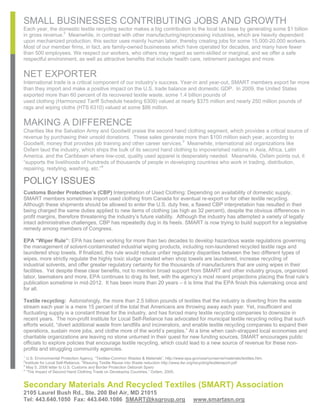SMART represents 200 small and medium-sized businesses involved in recycling and reusing pre-consumer and post-consumer textiles. This $1 billion industry employs 15,000-20,000 workers and supports economic growth through job creation and exports. The textile recycling industry is one of the oldest forms of recycling and prevents billions of pounds of textile waste from landfills each year. However, inconsistent supply and outdated policies threaten the long-term viability of the industry.

